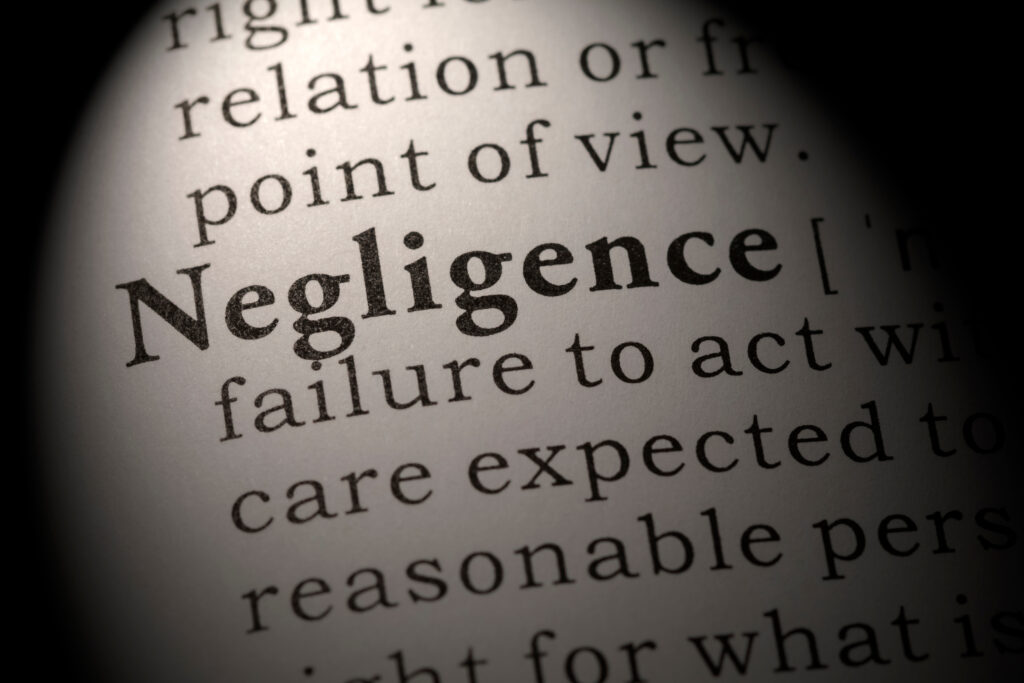Suffering an injury because someone else behaved negligently may mean you have the right to seek monetary damages. The damages will vary depending on a number of factors, including the severity of the injury, the time lost from work recovering from an injury, and uncovered medical expenses.
Understanding Negligence
In Pennsylvania, negligence is defined as a failure to exercise the same level of care that a reasonable person would under similar circumstances. When this occurs and a person is harmed, the victim must be able to prove elements of negligence.
Elements of Negligence in Pennsylvania
When a victim has suffered an injury, and they believe the injury could have been avoided if not for another’s negligence, they must be able to prove:
- Duty of Care — that the person owed the victim a duty of care.
- Breach of Duty — the person responsible for the injury failed to act reasonably.
- Causation — the breach of duty resulted in an injury.
- Damages — the victim suffered a monetary setback due to the injury.
Each of these elements must be proven to file a successful claim. A Pennsylvania personal injury attorney can review your case and help evaluate these elements.
Statute of limitations for negligence in PA
Generally, a victim has two years after suffering an injury to file a claim. However, some circumstances can extend this timeframe, including:
- Victim’s Age — when a minor child suffers an injury, the two-year period begins when they reach age 18.
- Discovery — when an injury is not immediately identified, the statute of limitation may not begin until such time as the injury was discovered.
What Constitutes Negligence in Pennsylvania
Examples Of Negligent Actions
Victims may be harmed due to medical malpractice, roadway accidents, premises liability, and product liability, to name a few. Some examples of actions which could cause harm include:
- Misdiagnosis or delayed diagnosis
- Surgical errors
- Medication errors
- Distracted driving
- Drunk driving
- Speeding or reckless driving
- Slip and fall accidents
- Inadequate security on premises
- Building code violations
- Defective products
- Failure to warn
Duty Of Care In Pa
Duty of care is a legal obligation. It requires both individuals and entities to adhere to a reasonable level of care when performing an act if such an act could potentially harm a person.
Examples of a breach of care include a building owner who has failed to repair a defect that could result in an injury or a driver who acted recklessly while operating a motor vehicle.
Proving Negligence in Pennsylvania
Gathering Evidence
To prove negligence in Pennsylvania personal injury cases, the victim must provide certain evidentiary materials. These may include videos or photos of the incident, surveillance footage, police or accident reports, and evidence of injury. Other items may be required to prove negligence that your personal injury attorney can help you gather.
Demonstrating Breach Of Duty
A breach occurs when one party fails to fulfill their obligations or duties to another party, resulting in harm or damage. Demonstrating a breach of duty may include showing a person operating a vehicle failed to obey traffic signals or laws, a doctor failed to act in a manner that another doctor would have acted under reasonable circumstances, or a building owner failed to repair a known hazard.
Each personal injury claim is different, and a personal injury lawyer can help you determine what is required to show that a duty of care was breached, resulting in an injury.
Showing Causation
Causation is a requirement in personal injury cases. The injured party must show that the victim suffered an injury or harm as a direct result of the party’s failure to adhere to the usual duty of care.
Establishing Damages
Before a personal injury claim can be filed, the victim must demonstrate they have suffered economic or non-economic losses. Economic losses include wage and benefit losses, replacing personal property, medical expenses, and potential home modifications. Non-economic losses may include pain and suffering, loss of enjoyment of life, and other factors.
A Pennsylvania personal injury attorney can help victims determine the extent of their damages by gathering medical statements, witness statements, and other evidence.
Winning A Negligence Case In Pennsylvania
Presenting A Strong Case
It is not always easy to demonstrate that a victim is entitled to compensation for their injuries. While some victims may feel they can represent themselves, working with experienced legal counsel can help significantly. Victims who work with an experienced personal injury lawyer will generally have a better outcome in their cases.
Working With Legal Counsel
An experienced personal injury attorney has knowledge of the laws that impact personal injury victims. This is important because each personal injury claim is different. Victims who attempt to represent themselves in these cases often do not understand Pennsylvania laws or how to prove someone was negligent, resulting in an injury.
Negotiating Settlements
One of the most important aspects of a personal injury case is ensuring the victim gets the maximum possible settlement. When someone works with an experienced personal injury lawyer in Pennsylvania, they can feel confident the attorney will be advocating on their behalf.
No attorney will ever accept a settlement without the client’s approval. Victims always have the final say as to whether to accept a settlement, take a case to court, or pursue other legal avenues to get the compensation they deserve.
Contributory Negligence in Pennsylvania
Understanding The Legal Principle
Contributory negligence means that both the victim and the responsible party may bear some liability for an accident. An example of this may include someone on their cell phone while driving and being struck by a speeding vehicle. Another example could be someone who is injured while on someone’s property. They may have been distracted and missed an obvious hazard, resulting in an injury.
How Contributory Negligence Impacts A Case In PA
Assuming the responsible party can prove the victim was partially at fault for their injury, the victim’s compensation may be reduced. It is important to note that if the victim is determined to be more than 51 percent responsible, they may be unable to get any compensation by way of example. If you assume a settlement amount of $100,000, if the determination is the injured party is 25 percent responsible, their final settlement would be reduced to $75,000.
Experienced Pennsylvania Negligence Attorneys Ready to Fight For You
You need someone ready to fight on your behalf to get the maximum compensation for your injuries. The personal injury team at Scherline Injury Law is prepared to evaluate your case and help you decide on your best legal options. If we decide to move forward, we will leave no stone unturned to get you the maximum compensation you are entitled to for your injuries. For a free case evaluation, contact Scherline Injury Law today.
IMG Credit: Feng Yu






